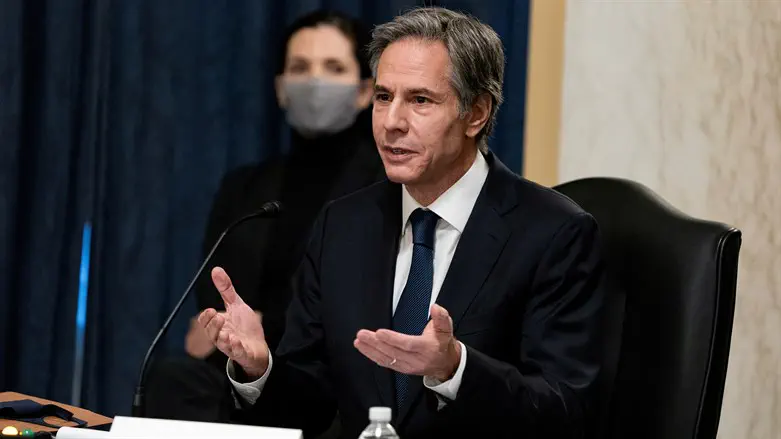
U.S. Secretary of State Antony Blinken addressed the American Jewish Committee (AJC) Global Forum on Monday, praising the advocacy organization for its work on foreign policy issues which “align with many of the United States top foreign policy priorities.”
“I’d like to thank AJC for its enduring partnership, for its ongoing work, and for all I know that we’ll continue to do together,” Blinken said, listing supporting Ukraine, combating antisemitism worldwide, supporting Israel’s security, preventing Iran from developing nuclear weapons, and expanding Arab-Israeli normalization and peace as areas of importance.
Speaking through a video address from the State Department, Blinken applauded the ACJ for its work on behalf of Ukraine.
“We are so grateful for AJC’s leadership in standing up for democracy and human rights around the globe, as we see in the recent solidarity with, and support for, the people of Ukraine, as they defend their nation against the Russian government’s war of brutal aggression,” Blinken said.
Pointing out that this is consistent with AJC’s longstanding advocacy for Ukraine, Blinken observed that “in 1991, AJC was the first Jewish organization outside Ukraine to call on President George H.W. Bush to recognize the country’s independence and has been a staunch supporter of a free and democratic Ukraine ever since.”
Blinken emphasized that “combating antisemitism abroad is not just the [job of special envoy Deborah Lipstadt]. It is the job of the entire State Department, one that we — and I — take very seriously.”
He added that “the United States is committed to working by your side to tackle the alarming rise in antisemitism around the world.”
“History has shown that hatred of Jews often goes hand in hand with hatred of other groups. And in places where antisemitism and Holocaust denial spread, repression and democracy backsliding are often not far behind,” said Blinken.
“That is why AJC’s commitment to fight all forms of religious intolerance is so critical. That is why this Administration has made combating antisemitism and all forms of bigotry a top priority for our domestic and foreign policy,” he added.
On U.S.-Israel relations, Blinken declared that “the United States commitment to Israel’s security remains ironclad.” He emphasized that containing Iran’s nuclear program was still a top priority for the U.S.
“We are determined that Iran will never acquire a nuclear weapon and we continue our close coordination with our Israeli partners to prevent Iran from developing one,” he said.
On the topic of normalization between Israel and Arab nations, Blinken commented that “normalization is becoming the new normal in the region.” He added that the White House was “committed to maintaining the momentum of the Abraham Accords, and is “working tirelessly to expand normalization with Israel’s neighbors.”
He cited examples of Morocco and Israel agreeing to open embassies in Rabat and Tel Aviv; Prime Minister Bennett becoming the first Israeli prime minister to visit Bahrain and the United Arab Emirates; Israel and Bahrain signing over a dozen agreements to deepen economic ties; and a Holocaust memorial exhibit opening in Dubai.
Touching on the subject of the U.S., Israel and the UAE holding the inaugural meeting of the trilateral religious coexistence working group, which will bring together governments and religious figures from across the region “to counter intolerance and hatred, including antisemitism,” Blinken said: “If this sounds like the work of AJC, it is no coincidence. Fostering these kinds of ties has been one of AJC’s goals for decades.”
